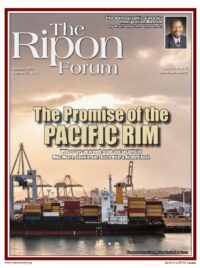
Given recent regulatory changes in federal fuel-economy standards for cars and trucks, the consensus forecast is that motor fuel taxes will not be an adequate source of dedicated funding for roadway maintenance and construction. Many experts believe we should eliminate the fuel tax and replace it with a user fee based on the number of miles driven, but that’s easier said than done given the current political climate around taxes.
A road user fee charges each driver for the number of miles driven. The fee structure can be modified to account for vehicle weight, which is known to be one of the main determinants of road wear and tear. However, implementing a road user fee faces some challenging issues that must be addressed before receiving wide acceptance. First, how should vehicle miles traveled be measured? One approach is to use the mileage recorded by the odometer, which is a standard feature in every motor vehicle. This information could be collected through self-reporting by drivers or visual inspection by public servants. In order to discourage fraudulent reporting, public servants could compare reported mileage with an estimate based on data from CARFAX reports, insurance companies, auto service centers, and a driver profile.
More technologically advanced methods are feasible but come with privacy and cost concerns. However, those worries are fading as automakers build cars with Internet and GPS connectivity and more insurance companies adopt pay-as-you-drive policies. Therefore, it may be possible – within the next 20 years – for the government to rely on the data collected by third-party entities such as insurance companies to implement the road user fee. The most important feature of these developments is that they are driven by market forces. Therefore, making this option available to drivers on a voluntary basis should reduce privacy and cost concerns that have plagued the idea of mandating new GPS devices in all cars.
…it may be possible – within the next 20 years — for the government to rely on the data collected by third-party entities such as insurance companies to implement the road user fee.
Replacing the gasoline tax with a mileage user fee has several advantages. First, the mileage user fee provides a more adequate and stable source of revenue for the construction and maintenance of roads. This is due to the fact that the road user fee does not depend on the amount of gasoline consumed. Therefore, the amount of revenues collected will not fall as the mileage ratings of cars improve over time.

Second, the mileage-based road user fee is more equitable than the gasoline tax when judged on the benefit principle. According to the benefit principle, a tax is equitable if its burden is distributed according to the benefits received from goods/services financed by the tax. Since the gasoline tax is used for road maintenance, repairs and construction, one could argue that those who drive more and therefore consume more road services should pay more. This feature of the gasoline tax is steadily being eroded by the rising use of fuel-efficient and all-electric vehicles. When a fee is based on the number of miles driven, it ensures that each driver pays according to the amount of road they “consume”. This is especially true if the fee structure is adjusted for vehicle weight.
When a fee is based on the number of miles driven, it ensures that each driver pays according to the amount of road they “consume”.
Another distinctive feature of the mileage user fee is its visibility to drivers. Because drivers are billed for the number of miles driven, it establishes a clear link between miles driven and user fee liability. This will likely lead to a desirable reduction in miles driven as drivers consolidate trips and car pool in order to reduce their user fee liability. Although the road user fee reduces the incentive to purchase fuel-efficient cars compared to the fuel tax, the environmental impact of driving is best addressed with a tax on the amount of pollution produced or a regulation on tailpipe emissions.
Finally, a GPS-based mileage user fee would also allow policy makers to address local traffic congestion. A surcharge could be implemented for driving during peak hours in congested areas or driving on particular bridges or expressways (similar to a toll).
There is never an easy time to propose a new tax, even one that replaces an existing tax with a user fee. Fortunately, the ongoing fiscal debates in Congress may lead eventually to comprehensive tax reform. Such a bill could include the replacement of the fuel tax with a mileage user fee. The alternative is inevitably more broken roads and bumper-to-bumper traffic. Failure to act also implies larger deficits as the Federal government continues to supplement the highway trust fund with transfers from the general fund.
Denvil R. Duncan is an assistant professor in the Indiana University School of Public and Environmental Affairs. John D. Graham is dean of the school.




